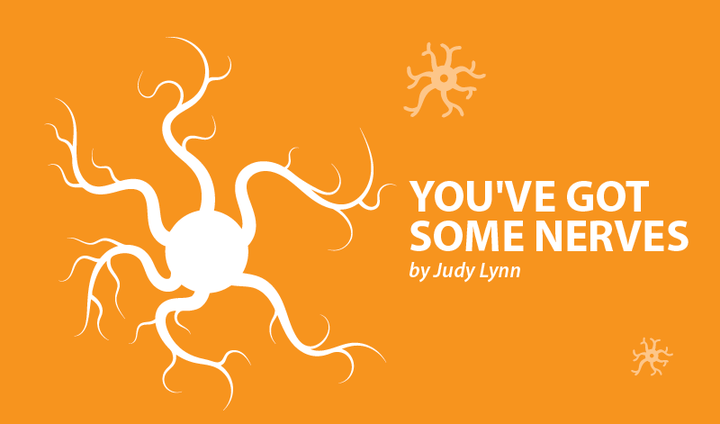MS Support Groups: Pot Brownies, Shoes, Bladders — and Inspiration


What do pot brownies, shoe shopping and bladder control have in common? These are just a few of the varied MS self-help support group discussion topics in which I have enjoyed participating.
I have been an attendee and group leader of two National MS Society self-help groups. I also take part in several various online webinars and groups, and spent a wonderful three days at a Women with MS camp.
The wealth of knowledge on reserve in the lived experience of others with MS is priceless.
According to The National MS Society, self-help or support groups benefit MS patients by:
- Learning new information and strategies for confronting problems.
- Finding support from others.
- Extending the opportunity to help others.
- Feeling empowered and more self-confident in coping with challenges.
So, what’s not to love? Why isn’t everyone joining in this group hug? (Way better than an MS hug!) Over the past 13 years I have heard a variety of reasons why people don’t feel an MS support group is right for them. These range from logistical concerns like “I don’t have childcare,” to feelings of fear, such as “I don’t want to see people in wheelchairs.”
The advent of online groups, and even some for particular audiences such as parents or young adults, helps to break through some of those barriers. There are many online groups. MSconnection.org is offered by the National MS Society, but there are other platforms. I encourage you to find a group that meets your needs. I participate in groups for writers with MS and have had the opportunity to have my writings published in anthologies because of these groups.
Despite the benefits of online groups, I still like to meet people face-to-face and in my local community. But what about those fears? Are there people with walkers and wheelchairs in the groups? Yes. Do people talk about scary symptoms, like loss of bladder control, walking or depression? Yes. Is it depressing? No. Not for me. We may talk about depression, but we probably will be laughing as we do. MS is a crappy disease that can manifest in so many ways it is dizzying. Luckily, most of us don’t get hit individually with all the symptoms.
However, collectively we often have the bases covered, which means we can learn something different from everyone. It seems to me that individuals with MS, perhaps because of the ever-changing nature of our disease, are some of the most creative and resilient people.
These in-person groups have helped me:
- Learn about the MS Navigator program that helped me sort out the various processes and financial assistance when I needed hand controls for my vehicle.
- Have non-judgmental, and often humorous, conversations about marijuana. This lets me ask the questions that I may be too timid to ask my provider.
- Get to know people who understand that it’s a Herculean effort to parent and work full-time, with MS; meet people who know my situation well enough to remind me to put on my own oxygen mask first, before helping others.
- Lend an empathetic ear and share my experience about workplace disclosure and reasonable accommodations.
- Witness courageous and creative adaptations to problems with walking, bladder control, pain, fatigue, etc.
The fear that might try to grip my heart when I see a fellow MS warrior valiantly pushing a walker through a set of double doors is completely overshadowed by the absolute light of admiration created by their courage and determination to keep going. Not only are they pushing that walker, but it is laden with bags of meeting snacks, a coffee maker, and educational materials for their fellow attendees. And the face above that walker is smiling.
My fellow group members work, parent, grandparent, volunteer … they live, laugh, love and learn. They don’t frighten me at all. They lift and inspire me. If they can do it, I can do it.
So, thank you, my MS self-help heroes. You know who you are.
Note: Multiple Sclerosis News Today is strictly a news and information website about the disease. It does not provide medical advice, diagnosis, or treatment. This content is not intended to be a substitute for professional medical advice, diagnosis, or treatment. Always seek the advice of your physician or other qualified health provider with any questions you may have regarding a medical condition. Never disregard professional medical advice or delay in seeking it because of something you have read on this website. The opinions expressed in this column are not those of Multiple Sclerosis News Today, or its parent company, Bionews Services, and are intended to spark discussion about issues pertaining to multiple sclerosis.







Lynne
Great piece Judy! You expressed in the eloquent way only you can do, exactly why those of us living with MS need to support each other. Take care my friend & enjoy this new time in your life.
Judy Lynn
Thank you so much, Lynne!
Kimberly Jignson
My son is 22 & has severe MS. Hes lonely, sweet & good looking. He needs an MS group for his age group becauze his experiences are different than an older persin. He was 18 & getting ready 4 independence. Now hes not able to be independent due to physical but especially cognitive reasons. People think its only the body that fails but with 50 lesions, its cognition as well. He needs young people affected who understand what if means when you arw thinking of driving, marriage, college etc and suddenly can hardly walk or see and now losing hand coordination. All support groups in or near Norfolk VA are for older people.
Michelle
Just want to offer a shout out for hope. I’m a 43 yr old female diagnosis at 28. Please look into removal of metal dental fillings and chelation therapy.... all of my progress came from naturopathic therapies. Traditional meds have all made me SICKER. Your son is too young. Starting on any med early on is good, but he doesn’t have to stay on if it’s not for him. As for support groups, that is hard. I’ve never found anything for me, either.
Joyce
I am a Nigerian..now 24 BT first had my first encounter with ms at 18 .it hasn't been easy cos its nt common around here.my family are being supportive BT dey don't understand hw lonely and invincible I feel.I really need to join a community BT I havnt been sucesful.I want to share experiences.if u can help plz do
Debi
Hi Joyce,
I understand how you feel and I would like to invite you to join our MS forums. http://multiplesclerosisnewstoday.com/forums/
It is a growing and sharing MS community. I hope to see you there!
Ed Coffey
My mom is 59 years old she has Ms she is not able to walk no more she is now in a wheelchair she relies solely on me and my wife we cook for we have set up a personal apartment for her we have our own portable toilet wheelchair medical bed and everything else that you can think of we are having a major issue with her urinating on herself and just sitting in it all day we have tried everything underneath the Sun to help her we are out of options is there any buddy else in the same situation please we need help suggestions or anything we live in the Nashville Tennessee area if anybody knows any kind of support groups or anything to help us it would be greatly appreciated please help thank you
Diane S Dowling
Try SunCrest Home Health. I know they were working on a bladder training program. Unsure if it's available there yet.
Dana Eglite
I’m looking for some shoes casual and dressy casual that will not grab the carpet and make your trip. Need something that you can just scoot along on the floor. Anything rubber has too much traction for me. Any thoughts?